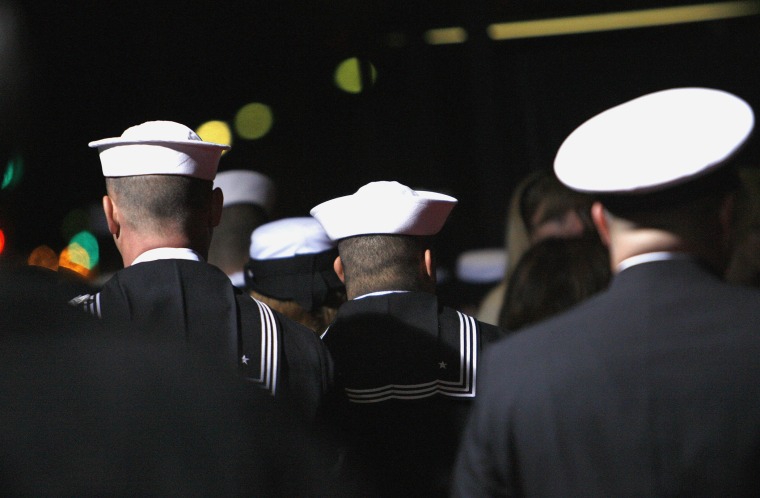Late last week, Donald Trump made an unfortunate decision to intervene in three murder cases involving U.S. service members. As NBC News reported, the president used his authority to dismiss charges against a Green Beret accused of killing an Afghan man, pardoned a former Army officer serving 19 years for ordering soldiers to fire on unarmed Afghan men, and promoted a Navy SEAL who was convicted of posing with a dead body but acquitted of more serious charges.
For military justice experts and some senior Pentagon officials, the proper thing for Trump to have done was nothing. The Republican ignored them.
For the U.S. Navy, however, one of Trump's actions obviously didn't sit right. At issue is Edward Gallagher, who was ordered dropped in rank from chief to petty officer first class following a trial in which he was accused of murder and war crimes. He was acquitted, though his punishment stems from a conviction on a lesser count.
Trump reversed the Navy's decision, and the service branch had no choice but to accept the president's order. That said, the Navy soon after explored stripping Gallagher of his gold eagle Trident emblem, so that he would no longer be a Navy SEAL.
This morning, Trump decided to ignore the Navy's wishes on this front, too.
President Donald Trump on Thursday said he will not allow the Navy to take away an emblem signifying membership in the elite SEALs unit from an officer convicted of posing with an teen ISIS fighter's corpse."The Navy will NOT be taking away Warfighter and Navy Seal Eddie Gallagher's Trident Pin. This case was handled very badly from the beginning," the tweet read. "Get back to business!"
Fred Wellman, an Army veteran and the head of a marketing firm advocating for veterans and military families, explained soon after, "In many ways this is worse than the pardons. This is an overt act directly undermining the ability of the Navy to maintain good order and discipline of their forces. Gallagher was convicted of posing with a dead enemy. Many have lost their tridents for less. This is outrageous."
Yesterday morning, Bloomberg Opinion's Jonathan Bernstein had a good piece along these lines, explaining, "One problem here is that Trump doesn't seem to grasp that the U.S. military actually values its own rules."
Quite right. As we discussed the other day, this isn't a dynamic in which active-duty troops and veterans stood with the accused, so Trump took steps to appear “pro-military” ahead of his re-election campaign. There’s ample evidence of the opposite, with troops and veterans taking a stand in support of military discipline, the rule of law, and the integrity of the Uniform Code of Military Justice system.
There’s no evidence, meanwhile, that Trump knows or cares about any of this.
* Postscript: The New York Times reported a month ago that Rear Adm. Collin P. Green, following a series of scandals on Navy SEAL teams, has "come down hard on misconduct" and taken aim at the "ethics problem" within the ranks. Trump is obviously making Green's job far more difficult -- for no good reason.
"People want to hold these guys accountable," said a Navy officer involved in a push to strengthen discipline. "But they are afraid that if you do anything, minutes later there will be a tweet from the White House, and the officer in charge will get axed."
